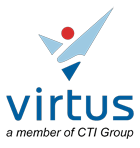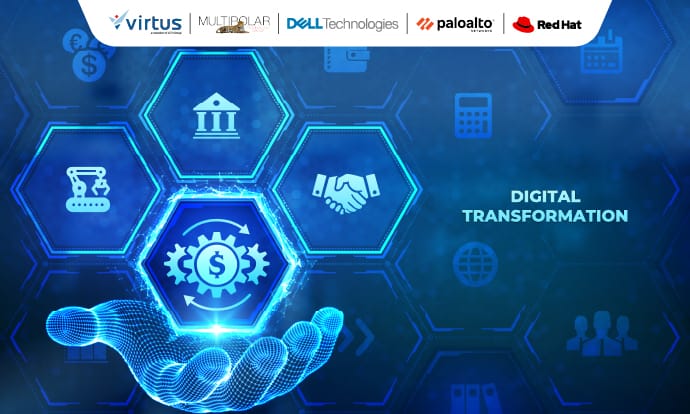Digital transformation has become essential for businesses to remain competitive in today’s modern era. The dynamic global economy and the post-pandemic impact have accelerated the need for digital innovation across various business sectors. In this context, Virtus Technology Indonesia and Multipolar Technology have joined forces to deliver comprehensive digital transformation solutions for businesses in Indonesia.
So, what are the strategies, benefits, and the right time to start your digital transformation journey? Find the full answers in this article, and discover how Virtus and Multipolar Technology can help your business take the next step toward digital transformation.
What is Digital Transformation?
Digital transformation is the process applied by companies to integrate digital technologies across all aspects of their business. This process fundamentally changes how companies deliver services to their customers.
Companies that undertake digital transformation and adopt technology innovatively will bring about changes in internal culture and business operations. This is because digital transformation encourages companies to adapt better to changes that meet customer demands.
Examples of digital transformation can be seen in efforts such as companies building digital solutions like mobile apps or e-commerce platforms, migrating from on-premises infrastructure to cloud computing services, and adopting IoT devices to reduce business operational costs.
Why Are Traditional IT Infrastructures (Monolithic) No Longer Sufficient in the Digital Age?
Traditional IT infrastructures based on monolithic architectures often hinder this transformation. Monolithic architecture is difficult to update because all components are connected as one large unit. Any change, even a minor one, requires retesting the entire system, leading to high downtime and slowing down the pace of innovation. Additionally, monolithic systems are difficult to scale incrementally, requiring inefficient overall resource upgrades.
On the other hand, monolithic systems also present higher security risks. If one part of the system encounters a problem, the entire system could be affected due to the strong interconnections between components. This makes integration with new technologies challenging, limiting a company’s ability to keep up with ongoing changes. That’s why many companies are now shifting to more flexible microservices solutions that better support the needs of digital transformation.
3 Areas to Focus on During Digital Transformation

Digital transformation in companies typically focuses on three key areas to improve efficiency and deliver more value to customers:
Operational Transformation
Digitizing internal processes to make them more efficient, reduce errors, and increase operational speed. Examples include workflow automation and the use of AI for predictive analytics.
Customer Experience Transformation
Enhancing interactions with customers through digital channels, such as mobile apps, interactive websites, and customer analytics to personalize experiences.
Business Model Transformation
Adopting new business models, such as subscription-based services or e-commerce, to meet changing market demands and improve competitiveness.
Examples of Digital Transformation Across Various Industries
Finance/Banking/FSI (Financial Services Industry)
The financial industry has embraced digital transformation to improve efficiency and security. Examples include:
- Back-office process automation: Reducing costs by automating manual processes such as transaction processing and reporting.
- AI and ML technologies: For better customer data analytics, service personalization, and fraud detection.
- Mobile apps and online banking: Providing 24/7 access for customers and improving user experience.
Construction
In the construction industry, digital transformation includes using technology to improve project management, minimize errors, and enhance safety. Examples include:
- Building Information Modeling (BIM): Enhancing collaboration among teams with 3D visualizations of projects.
- Drones and IoT: Used for real-time monitoring at construction sites, reducing costs and improving safety.
Manufacturing
The manufacturing industry uses digital technologies to boost production and efficiency. Examples include:
- Industrial Internet of Things (IIoT): Connecting devices in factories to collect data and perform predictive analytics.
- Automation and robotics: Helping improve production efficiency and reduce human error.
Government and Public Sector
Digital transformation in the public sector helps improve public services and transparency. Examples include:
- E-Government services: Providing online access to public services like identity registration and licensing.
- Data analytics: For better data-driven decision-making, especially in areas like health and public safety.
Challenges of Digital Transformation and Their Solutions
Facing the challenges of digital transformation is not easy. From high costs, data security risks, to the need for flexible and adaptable infrastructure, every aspect requires tailored solutions that address the unique needs of businesses. To overcome these challenges, companies need solutions that not only support innovation but also simplify management and enhance security in their digital environments.
Red Hat OpenShift, Dell Technologies, and Palo Alto Prisma provide a combination of solutions that are well-suited to help businesses tackle these challenges. Red Hat OpenShift offers a robust platform for managing container-based application development, Dell Technologies provides scalable infrastructure for application needs, and Palo Alto Prisma ensures top-tier security to keep data and applications safe.
Red Hat OpenShift, Dell Technologies, and Palo Alto Prisma: Integrated Solutions for Business Digital Transformation
1. Red Hat OpenShift
Red Hat OpenShift is a Kubernetes-based platform designed specifically for developing and managing container-based applications. This solution allows companies to build, run, and manage applications more quickly in a hybrid cloud environment, making it highly supportive of the flexibility and scalability required for digital transformation.
Key Features:
- Container Orchestration: Uses Kubernetes to automatically manage, scale, and orchestrate container applications efficiently.
- Strong Automation: Streamlines CI/CD pipelines with DevOps integration, speeding up application development and deployment.
- Cloud-Native Integration: Supports hybrid and multi-cloud environments, allowing companies to run applications on various cloud platforms without restrictions.
2. Dell Technologies
Dell Technologies provides a solid Hyperconverged Infrastructure (HCI) solution that combines computing, storage, and networking into one solution to support modern container-based applications. This infrastructure enhances efficiency and simplifies management, making it an ideal choice for businesses needing high performance and adaptability in their digital transformation efforts.
Key Features:
- Dell HCI (Hyperconverged Infrastructure): Simplifies infrastructure management and optimizes resource integration for better performance.
- High Flexibility and Scalability: Easily customizable to meet changing needs, allowing businesses to scale capacity quickly and cost-effectively.
- Cloud Integration: Supports integration with multiple cloud platforms, giving companies full flexibility in running applications in the environments they choose.
3. Palo Alto Prisma Cloud
Palo Alto Prisma Cloud is a purpose-built solution for cloud-native environments, enabling businesses to gain visibility and monitor the security posture of their applications against various cyber threats. With comprehensive protection for multi-cloud environments, Prisma Cloud empowers businesses to pursue digital transformation without compromising security.
Key Features:
- Cloud Security Posture Management (CSPM): Continuously monitors security posture, detects and responds to threats, and ensures compliance across multi-cloud environments.
- Cloud Workload Protection (CWP): Delivers vulnerability management, compliance monitoring, runtime security, access controls, and anomaly detection for workloads.
- Cloud Application Security: Helps identify vulnerabilities, misconfigurations, and secrets in infrastructure-as-code to fortify cloud-native applications.
Why the Combination of These Three Solutions is the Best Option for You

The combination of Red Hat OpenShift, Dell Technologies, and Palo Alto Prisma provides a holistic approach to digital transformation, enabling businesses to move faster and more securely towards a modern digital environment. OpenShift, at the software layer, offers a flexible and easily manageable container development platform. With orchestration and automation features, OpenShift helps development teams build, test, and launch applications more efficiently. This accelerates the development cycle and allows for quick adaptation to dynamic business needs.
Additionally, Dell Technologies supports OpenShift from the infrastructure layer with solutions like Hyper-Converged Infrastructure (HCI), which integrates computing, storage, and networking into one unified system. With Dell HCI, businesses can maximize infrastructure performance and efficiency while maintaining the flexibility to adapt to changing workloads.
On the security front, Palo Alto Prisma provides comprehensive protection for applications and data running on container platforms. With features like network segmentation, AI-based threat detection, and automatic threat response, Prisma ensures that data and applications remain secure from cyber threats. When combined, these three solutions allow businesses to build a robust, flexible, and secure infrastructure, covering the entire technology stack from applications to infrastructure, providing a reliable foundation for successful digital transformation.
Read More: What is IT Automation: The Benefits and Challenges for Businesses
Plan Your Company’s Digital Transformation with Virtus & Multipolar Technology
Virtus Technology Indonesia (Virtus), in collaboration with Multipolar Technology, offers integrated digital transformation solutions tailored to meet the needs of modern businesses. As an authorized distributor of Red Hat OpenShift, Dell Technologies, and Palo Alto Prisma Cloud, Virtus delivers top-tier technology to accelerate application development, manage infrastructure, and enhance security. Backed by extensive experience as part of the CTI Group, Virtus and Multipolar Technology ensure optimal technology implementation through certified technical teams and 24/7 support.
This collaboration provides end-to-end solutions such as Red Hat OpenShift, designed to streamline application development with its flexible container platform and DevOps support. For infrastructure needs, Dell Technologies offers scalable and efficient Hyper-Converged Infrastructure (HCI), ensuring smooth operations and simplified management. On the security front, Palo Alto Prisma Cloud delivers advanced AI-driven protection against threats in multi-cloud environments, safeguarding your data and applications.
Through this integrated approach, Virtus and Multipolar Technology empower your business to tackle digital transformation challenges with efficient, secure, and reliable solutions. Contact Virtus and Multipolar Technology today for further consultation and start your digital transformation journey to drive your business growth.
Author: Ary Adianto
Content Writer, CTI Group



























